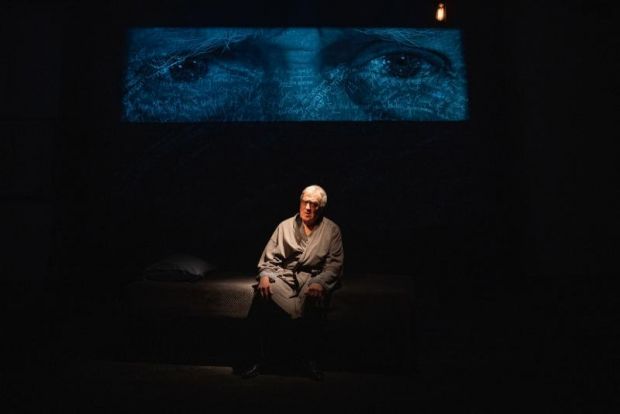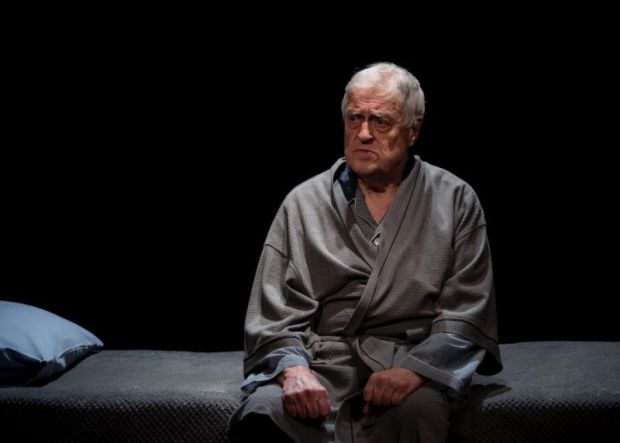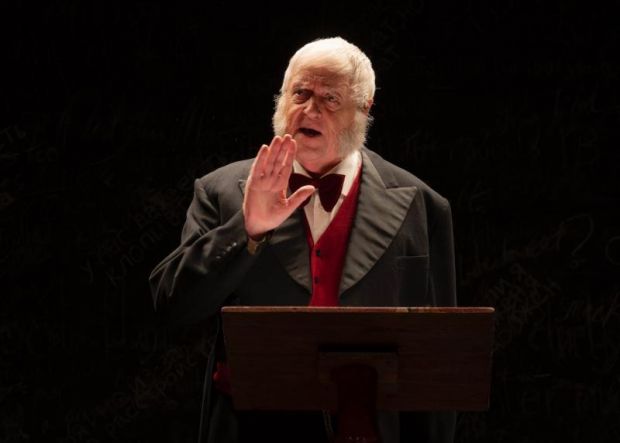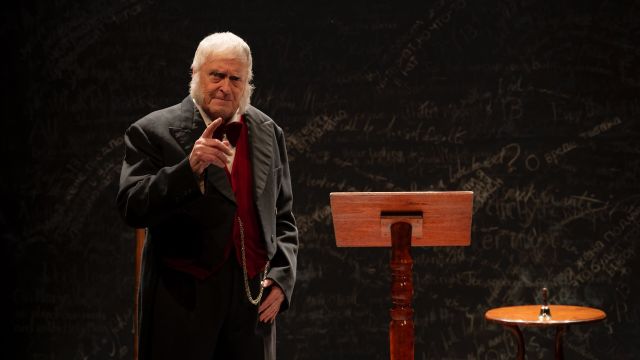Endgames: three short works by Hibberd, Beckett and Chekhov
This trio of very different ‘short works’ shows the magic of theatre. What links each of them is the persistence of memory – but not of sunlit fields or romance. On the contrary. As Chekhov’s clownish Nyukhin says (almost in passing), ‘I wish I could forget my past.’ The theme is reflected in Jason Lehane’s suggestive palimpsest back drop, covered in handwritten quotes from the texts – including in Cyrillic. Each of the collaborators (including, of course, the dead writers) makes their distinctive contribution and it all comes together in an evening of sad stories that is somehow uplifting.

Director Laurence Strangio chooses to play the extract from Stretch of the Imagination in just enough light for us to see that the stage is empty and that Lehane’s intriguing backdrop has an eerie glow. And so, we listen intently to the isolate Monk O’Neil’s rambling, grumpy monologue (the voice is Max Gilles’ of course) and all the sounds of Monk’s waking and morning ablutions, including a very long piss... Darius Kedros’ soundscape is as if we have an ear pressed to a wall and we imagine what we cannot see. Eventually, Monk, in what might be a beanie and an Onkaparinga dressing gown, crosses the stage, carrying a rifle, intent on settling some irritation. The monologue continues to relate the fate of Mort, a rare visitor to Monk’s shack on One Tree Hill. This is an iconic piece, originally from 1972, but I doubt that anyone in the audience had not heard it before (performed at times by Gilles himself) – but not like this. Underneath Monk’s defiant assertion of self-sufficiency we might sense an aching loneliness and wonder what brought him to this.

The second piece, Eh Joe, is a succinct example of Samuel Beckett’s apparent ‘anti-theatre’. Amazingly, it was written for television in 1965. Amazing, because there is nothing to see – except the face of a man sitting otherwise motionless on a bed as he - ‘Joe’ - is tortured by a memory that we are sure he wishes he did not have. The memory is conveyed in Voice Over by Jillian Murray. Here Kedros tweaks and amplifies Murray’s voice with subtle repeats and overlays. The memory is of an old and lost lover. She taunts ‘Joe’, forcing him to remember his failures and his loss. Is it what she really said? Or is it what ‘Joe’ imagines she would have said? Whatever - it is wince-making in its relentless, almost sadistic cruelty, made all the worse by ‘Joe’s’ knowledge that he deserves every lash. As waves of memory assault him, Richard Vabre’s lighting changes until only the face is lit – while above and throughout, a B&W ECU of a man’s suffering eyes is projected on the backdrop. It would have been easy (and possibly tempting) to illustrate or over-react to that voice. Instead, we see Max Gilles’ superb discipline and Strangio’s attention to nuance and detail. Gilles reacts, certainly, and the intense focus ensures we see each flicker and feel with Joe. As a result, we hold our breath, tense to the end.

After a needed break, Gilles returns in a comic persona possibly more familiar to many of us, here as a bumbling 19th century fellow in a frock coat and a red waistcoat. He’s there to deliver a lecture on the Harmfulness of Tobacco. But because the writer is Chekhov (who apparently wrote and rewrote this piece over sixteen years!) there’s dark underside to Nyukhin’s ‘lecture’. It quickly diverts into excuses, self-justifications, self-pity, irrational complaints about his four daughters, the whinges of the henpecked husband (he tells us, as if much-put-upon, that his Head Mistress wife calls him ‘Imbecile’), and his fear that he will be caught out by her at any second. It’s funny, but it’s horrible. We might ask why he is giving a lecture and why instead he is telling us all this. But we don’t and, although this piece is, in its own way, as black as the others, it sends us out still laughing at the irrepressible, wonderful chameleon Max.
It's hardly surprising that the very short run of this show is just about booked out already. If you can secure a ticket, do so.
Michael Brindley
Photographer: Jodie Hutchinson
Subscribe to our E-Newsletter, buy our latest print edition or find a Performing Arts book at Book Nook.

